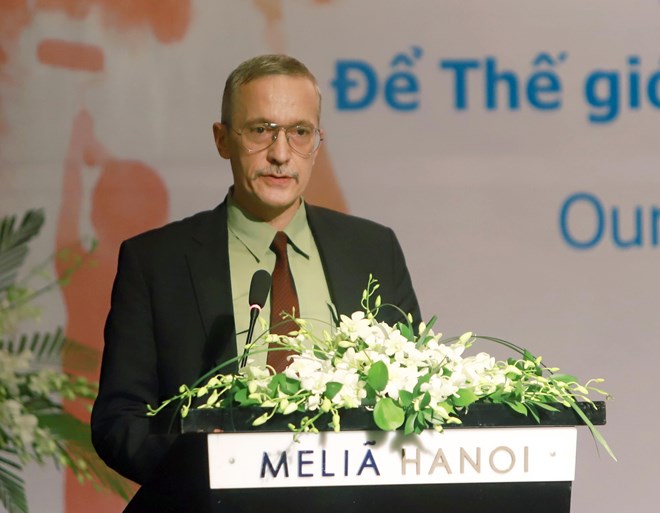World Food Day, FAO’s 40-year presence in Vietnam celebrated
 |
|
FAO Vietnam representative Albert Lieberg addresses the ceremony in Hanoi on October 16 (Photo: VNA) |
This year’s World Food Day message “Our actions are our future. A Zero Hunger world by 2030 is possible” is also at the heart of FAO’s mandate in Viet Nam, with action to ensure food security and nutritious diets for all an important area of work for FAO since it began operations in the country in 1978.
World Food Day and its Zero Hunger goal also reflect the spirit of FAO and the Government of Viet Nam’s fruitful partnership over the past four decades to transform the country from a large net food importer to the world’s third largest exporter of rice and ensure its population now has access to enough high-quality food to lead active and healthy lives.
The importance of partnerships to achieve Zero Hunger on global and national scales was underlined, especially with world hunger on the rise again and the number of undernourished people having increased in 2017 for the third consecutive year. Last year, 821 million people suffered from hunger - 11 percent of the world’s population or one-in-nine people on the planet. Meanwhile, other forms of malnutrition have also increased, with at least 1.5 billion people in 2017 having suffered from micronutrient deficiencies that undermined their health and lives.
“A world without hunger seemed to be a utopia for humankind until recently. However, unprecedented economic development over the last two decades in many parts of the world has opened up the possibility to realistically achieving this goal in the near future,” said Mr. Albert T. Lieberg, FAO Representative in Viet Nam.
In response, FAO urges all stakeholders to work collaboratively to achieve Zero Hunger goals, with public and private investments, risk-informed policies and interventions to ensure the poor and most vulnerable benefit from growth and employment opportunities.
Importantly, Zero Hunger is also key to achieving the 2030 Agenda for Sustainable Development. Many Sustainable Development Goals (SDGs), such as quality education and good health for all, cannot be achieved without first eliminating hunger. Food and agriculture also lie at the heart of the 2030 Agenda to end poverty, hunger and malnutrition to sustain natural resources and respond to climate change.
“Agricultural development is considered the most effective solution to Zero Hunger and poverty reduction initiatives in Viet Nam, which make a contribution to the SDG on ending hunger, achieving food security, improving nutrition and promoting sustainable agriculture,” said Mr. Le Quoc Doanh, Vice Minister of MARD.
These goals are also key features of FAO’s current work in Viet Nam and build on the solid foundations set during the 40 years of FAO engagement in the country. Having entered Viet Nam soon after a period of conflict that had devastated the nation’s physical, economic and institutional capital, FAO quickly became an important partner and main contributor of agricultural sector technical assistance.
This partnership has seen FAO play leading roles in the implementation of almost 500 projects to support hunger eradication, poverty reduction, ensure food and nutrition security in areas such as crop production, animal husbandry, animal and plant health, forestry and fisheries.

